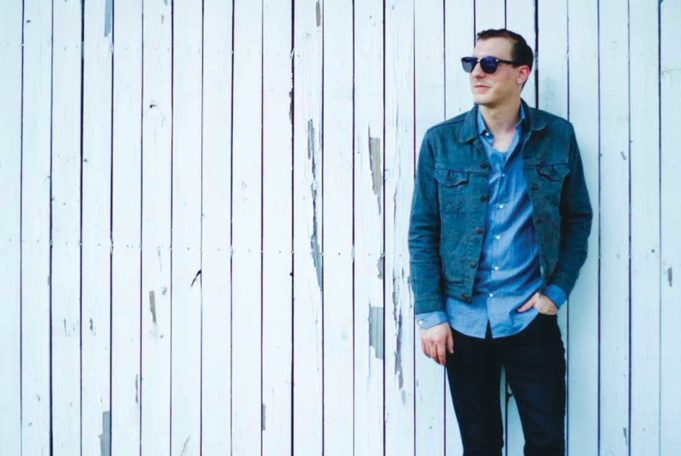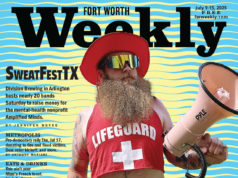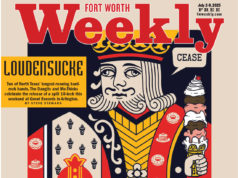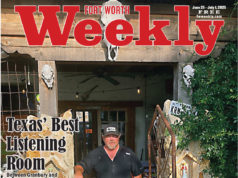You don’t have to be the Doris Kearns Goodwin of underground music to recognize that there’s usually a record label around which notable scenes bloom. And synonymous with those epicentric labels are often charismatic, hyper-motivated people who seem to make the whole thing go –– think Calvin Johnson and K Records or Ian MacKaye at Dischord. While he’s certainly not solely responsible for the burgeoning Fort Worth music scene, and his partners are just as responsible for his label’s fast-growing success (also, he would cringe at the comparison and humbly downplay his own contribution), Dreamy Life’s Cameron Smith is working on this type of association.
Smith has been a fixture in the Fort Worth music community for the last six years. There’s probably three degrees of separation between him and most other local indie artists of note (half of Bacon’s famous six). In addition to fronting organ-driven garage-punks War Party, he’s known for applying his DIY ethic to booking shows and recording and releasing music –– whether through Dreamy Life or one of its precursors, Lo-Life Recordings –– and dozens of bands have benefited from it. He’s also an occasional contributor to the Fort Worth Weekly when he can cover the rare local artist who isn’t associated with Dreamy Life. But the thing he deserves to be best known for is the fact that he’s a prolific songwriter. As War Party is putting the finishing touches on its third full-length, the poet-punk-inspired Smith, under the moniker Sur Duda (pronounced “dude-uh”) is releasing an album of solo material.
I sat with Smith and War Party’s Peter Marsh, who supplied guitar work on Smith’s new album, outside of The Grotto before an acoustic performance last week, and we discussed the album, the onerous marriage of art and commerce, and Bob Dylan.
“Basically, I write a lot,” Smith said. “I pretty much know what a War Party song is, and anything I think is not, I keep. And if I ever present a song to the band, and for whatever reason it doesn’t work, I just think, ‘Well, I’m gonna do it anyway.’ ”
Paper Knife is a collection of material from moments that span the length of Smith’s writing career. Recorded in three different phases at Cloudland Studios starting in September 2016, the songs feature a number of noteworthy local musicians. Jesse Gage (Movie the Band), Marsh, and singing-songwriting piano man Andy Pickett are just a few of the names who contributed. Production work was offered during the separate sessions by both Dreamy Life mainstay and co-owner Britt Robisheaux (Jandek, B.J. Thomas, Pinkish Black) and Peter Weirenga (Siberian Traps, Jake Paleschic). Grammy award-winning producer Jordan Richardson (White Denim, Son of Stan, Ben Harper) stitched the separate sessions together through mastering.
The 10 songs of smart, hooky garage-pop represent some of Smith’s most polished work. The title track, with its surfy guitar line and anthemic chorus, has already found airplay on KXT and other independent stations. Opening track “Baby Teeth” starts as a catchy comment on inexperience and the drive toward becoming experienced.
“They don’t call it payin’ dues / When you’re in there washing the dishes,” he sings. “They just call it payin’ dues / When their hands are holdin’ tickets.”
The song closes with a somber yet hopeful nod to the riots and racial tensions in Ferguson and Baltimore and mentions the latter city rising again from the ashes like a new forest after a wildfire.
“I saw the photo from the riots of a police car on fire,” Smith said. “And someone had spray-painted on the door of the car, ‘Take what you need and burn the rest.’ And I was like, ‘That’s kinda, um, rad.’ ”
He laughed, “Hell, yeah. Pass the matches.”
Other highlights include “Lie in It (Sunshine),” which was featured on Dreamy Life’s Group Therapy Vol. 4 compilation released last month; the tender ballad “Rearrange the Room,” a sentimental song about the narrator’s inability to supply the domestic comforts his partner desires; and “Fortnight,” a six-and-a-half-minute poetic channeling of Lou Reed built on three repeating chords –– ironically about boredom with the same old things –– though the tune never drags or seems monotonous.
Watching Smith and Marsh perform stripped-down acoustic versions of the album’s material that evening at The Grotto added a sharper focus on the witty social commentary and clever wordplay Smith employs in his lyrics. It’s no small feat to work in allusions to Jean-Paul Sartre along with simple songs about not being able to quit smoking. In a denim button down and flat cap with patchy beard, he looked every bit the part of the poet-punks from whom he draws inspiration.
Paper Knife will be available on cassette or digital download through Dreamy Life on Saturday.












